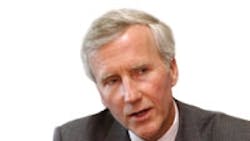Arvinmeritor's "3R" Strategy Yields Positive Earnings
Charles G."Chip" McClure is president, CEO and chairman of ArvinMeritor Inc., Troy, Mich., an $8 billion global supplier of integrated systems, modules and components to the motor vehicle industry.
On June 7, McClure told Wall Street analysts that he expected third quarter earnings to be at the higher end of a range of 60 cents to 70 cents per share, a forecast made in early May. On July 28, ArvinMeritor reported actual earnings of 66 cents per share. ArvinMeritor's earnings were widely viewed as a sign of improved health for the automotive parts industry, and a surge in share prices for companies in that business sector followed the company's announcements. ArvinMeritor Inc. serves light vehicle, commercial truck, trailer and specialty original equipment manufacturers and related aftermarkets, and employs about 31,000 people at more than 120 manufacturing facilities in 25 countries.
IW: Your recent earnings news led to some excitement over shares for automotive suppliers in general. What are the market factors that contributed to your improved forecast, and how long do you expect those factors to remain in place?
McClure: Our improved forecast is the result of several factors, including incredibly strong commercial vehicle sales in North America and around the world for the third quarter. We expect this sales trend for commercial products to remain strong for the next several quarters. We also have been able to capitalize on and to convert these strong sales into profit because we have an experienced talented leadership team, we're a global leader with No. 1 or No. 2 market share in most of our product lines, we have a strong continuous improvement culture and best-in-class global processes, we have a very diversified customer base, diversified global reach and diversified product line; and we're focused on technology and solving problems and providing our customers with innovative solutions.
IW: What strategies are you using to maintain those advantages?
IW: In light of continued cost-cutting pressures from your auto industry customers, and with costs for energy and raw materials continuing to rise, do you find it difficult to be a public company and to have your results closely scrutinized?
McClure: There is no doubt that the cost of raw materials -- most notably for us, steel -- has been a challenge and has had a major impact; however, we're beginning to see an easing on the price of steel. We have been proactive and successful in trying to mitigate the impact of raw material increases by finding other or lower-cost sources, looking for opportunities to engineer or design our products with alternative materials, and seeking a fair share of recovery from our customers. As a public company, we have to be transparent on any material changes and the way we operate, and in terms of disclosures on how these costs have affected our business.
